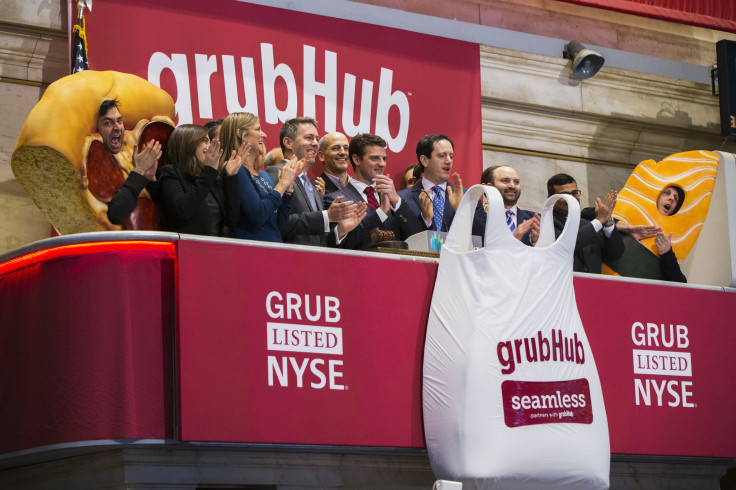Takeout Wars: Is GrubHub Seeking A Buyer Amid Competition In Food Delivery Industry?

KEY POINTS
- Competition in the food delivery industry is increasing
- The nascent industry is worth $10 billion
- GrubHub's value has dropped from a peak $13 billion in 2018 to $4.5 billion now
GubHub Inc. (GRUB) shares surged Wednesday amid reports the company could be seeking a buyer.
In early afternoon trading, shares were up 18%, but still well below their peak value in 2018. The Chicago company went public in 2014, but its market value has fallen to about $4.5 billion from $7 billion a year ago and $13 billion at its peak.
The food-delivery company, founded in 2004, has asked financial advisers to help it review options amid increasing competition and the decline in its share price, the Wall Street Journal reported.
The nascent food-delivery industry, born in 2011 with the founding of Postmates, has been valued at $10 billion by aggregators. DoorDash began delivering in Palo Alto, California, in 2013 and UberEats launched in 2014.
“The consumer migrated toward having this expectation of things being at our fingertips, from other industries — the Amazon effect, you could argue, contributed to some of this,” Aaron Allen, CEO of restaurant consultancy Aaron Allen & Associates, told CNBC.
The delivery services typically charge restaurants 15% to 30% per order, but newcomers have disrupted the model, offering discounts and promotions to gain customers. The Journal said investors and analysts want to see some consolidation.
At the end of October, GrubHub cut its revenue and profit forecasts. Third-quarter revenue was off 40% from the year ago quarter. Still, its number of active diners grew 29% from 16.4 million to 21.2 million.
Possible merger partners include DoorDash, Postmates and Uber (UBER), which saw its shares also trading higher. Amazon, which closed down its own food delivery service, also has been mentioned as a possible partner.
Restaurants have been rethinking their delivery options. McDonald’s renegotiated its contract with UberEats to lower costs while pizza giants Papa John’s and Pizza Hut opted to ditch their own delivery operations in favor of aggregators.
“It’s important for the restaurants to be thinking about and know how to select the right partner, knowing that there’s going to be consolidation likely going to happen,” Trevor Boomstra, director of AlixPartners’ restaurants, leisure and hospitality practice, told CNBC.
Still there are questions about profitability. Both DoorDash and Postmates are reported considering initial public offerings, but unprofitable companies are gun-shy in the wake of WeWork’s failure to launch last year.
© Copyright IBTimes 2025. All rights reserved.






















